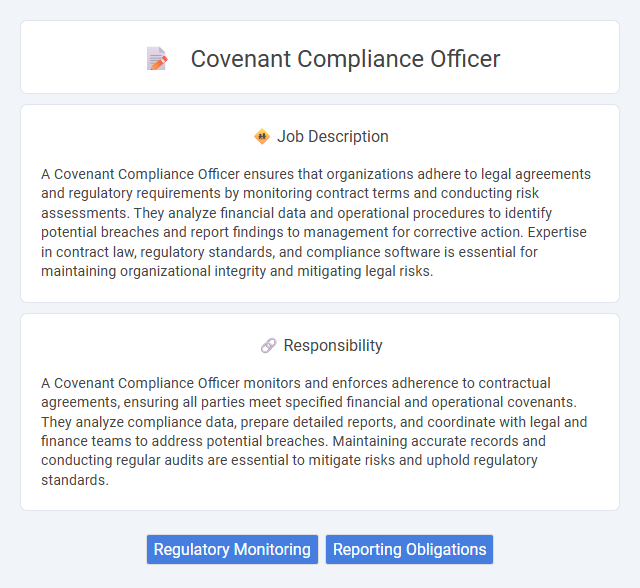
A Covenant Compliance Officer ensures that organizations adhere to legal agreements and regulatory requirements by monitoring contract terms and conducting risk assessments. They analyze financial data and operational procedures to identify potential breaches and report findings to management for corrective action. Expertise in contract law, regulatory standards, and compliance software is essential for maintaining organizational integrity and mitigating legal risks.
Individuals with strong attention to detail and a commitment to ethical standards are likely to be suitable for a Covenant Compliance Officer role, as the job requires careful monitoring of contractual obligations and adherence to legal frameworks. Candidates who are comfortable interpreting complex regulations and communicating effectively with various stakeholders may find themselves well-suited for this position. Those who prefer routine or lack analytical skills might face challenges in adapting to the dynamic compliance environment.
Qualification
A Covenant Compliance Officer typically requires a bachelor's degree in finance, law, business administration, or a related field, combined with strong analytical skills and attention to regulatory details. Professional certifications such as Certified Regulatory Compliance Manager (CRCM) or Certified Compliance and Ethics Professional (CCEP) enhance job prospects. Experience in contract management, risk analysis, and familiarity with financial covenants and legal requirements are critical for ensuring organizational adherence to compliance standards.
Responsibility
A Covenant Compliance Officer monitors and enforces adherence to contractual agreements, ensuring all parties meet specified financial and operational covenants. They analyze compliance data, prepare detailed reports, and coordinate with legal and finance teams to address potential breaches. Maintaining accurate records and conducting regular audits are essential to mitigate risks and uphold regulatory standards.
Benefit
A Covenant Compliance Officer likely enhances organizational integrity by ensuring adherence to contractual and regulatory requirements, minimizing legal and financial risks. Their role probably contributes to improved stakeholder confidence and streamlined audit processes. Firms employing such officers may experience increased operational transparency and reduced instances of non-compliance penalties.
Challenge
A Covenant Compliance Officer likely faces the challenge of continuously monitoring complex legal agreements to ensure adherence to strict financial and operational covenants. The role may require interpreting ambiguous contract terms under high-pressure situations, increasing the risk of misjudgment. Balancing meticulous documentation with the need for timely reporting could further complicate compliance efforts.
Career Advancement
Covenant compliance officers play a crucial role in monitoring and enforcing contractual obligations within financial and legal sectors, ensuring organizations adhere to loan agreements and regulatory standards. Career advancement opportunities often lead to senior compliance management roles, risk management positions, or specialized consultancy roles within large firms or financial institutions. Gaining certifications such as Certified Compliance & Ethics Professional (CCEP) and acquiring expertise in legal frameworks and financial regulations significantly enhance promotion prospects.
Key Terms
Regulatory Monitoring
A Covenant Compliance Officer ensures strict adherence to loan agreements and regulatory requirements by conducting continuous regulatory monitoring and risk assessments. They analyze financial covenants, track compliance metrics, and prepare detailed reports to prevent defaults and maintain contractual integrity. Their role involves collaborating with legal and financial teams to update policies in line with evolving regulations and industry standards.
Reporting Obligations
Covenant compliance officers are responsible for monitoring and ensuring adherence to loan covenants as specified in credit agreements, focusing heavily on accurate and timely reporting obligations. They prepare and submit detailed compliance reports to lenders and stakeholders, highlighting covenant status, potential breaches, and corrective actions. Effective reporting facilitates transparent communication and risk mitigation, safeguarding the borrower's financial integrity and maintaining lender confidence.
 kuljobs.com
kuljobs.com